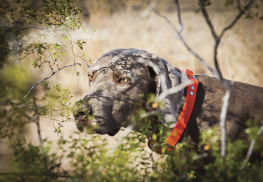The Kind Approach

Ben Randall has won the Cocker Spaniel Championship twice. He has bred and trained dozens of field-trial-winning and champion spaniels, as well as dogs for A-list celebrities such as Gordon Ramsay and David Beckham. And everything he does is based on his foundational training philosophy, one that is at odds with many other trainers. I visited him at his home in rural England to find out more.
There is no doubt that Ben Randall has a gift. And I don’t mean that in the way that most mothers think their children are gifted at piano or soccer or Legos. Ben is gifted in the way that Tom Brady is, or for those au fait with proper sports, he is gifted like Johnny Wilkinson or, to push the analogy even further, Joost van der Westhuizen.
You see, when it comes to handling and training dogs—gun dogs in particular, spaniels especially—Ben is, in my opinion, a genuine, world-class talent. And that assertion is not just based on his impressive field-trialing resume, list of accolades, or high-profile clients. I have known him for 10 years, and I’ve seen him compete in field trials and work dogs in the field on driven shoots, and I am yet to see someone with better control of their dogs, or perhaps more significantly, such a natural, gentle way of communicating with and getting the best out of them.
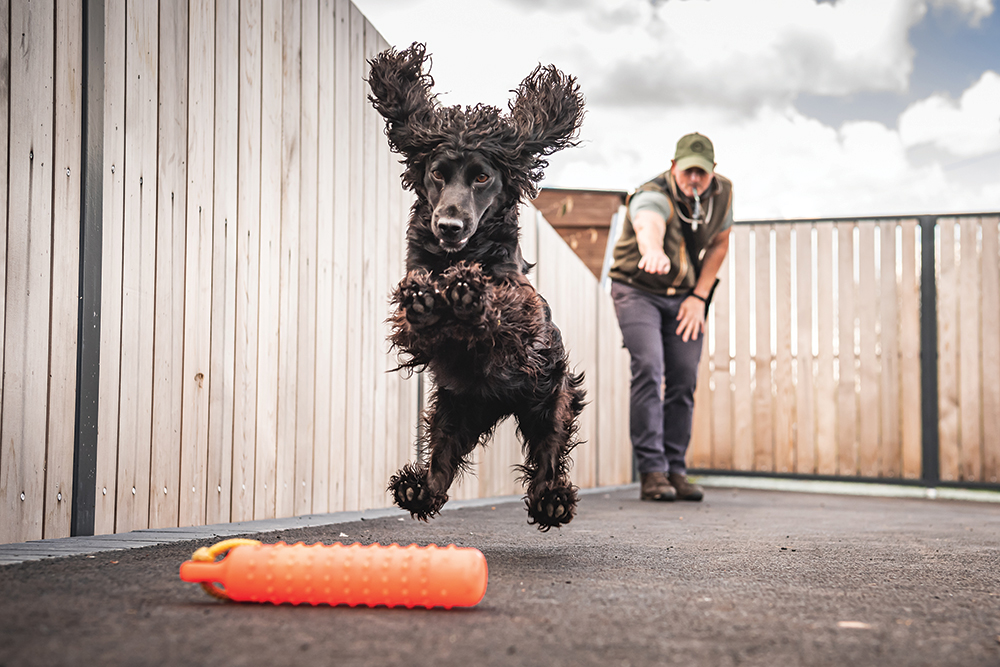
When you see Ben working one of his spaniels or Labradors, one of the first things that will become apparent is the adoration that his dogs have for him. They only have eyes for him, and there is such a keenness and obvious desire to work for him, it is genuinely moving. Theirs is a partnership forged through literally hundreds of hours together, and the trust between them, which goes both ways, is implicit. And that is no accident.
I will never forget watching Ben and his two-time Cocker Championship-winning Field Trial Champion, named Heolybwlch Fatty, known simply as “Fatty,” retrieve a winged pheasant on a driven shoot in Wales some years ago. The bird had fallen on the far side of a belt of conifers, some 300 yards away. But in order to reach it, one had to cross a fence, a stone wall, and a small stream, and then head up a gully only to come back down the far side, out of sight. And before Ben even sent Fatty for what seemed to me to be an impossible retrieve, I saw a look in both of their eyes that told me to stop what I was doing and pay attention.
I sure am glad I did, for what followed was nothing short of a gun-dog master class, the round of applause from beaters, Guns, and fellow pickers-up was testament to the quality of the performance they put on for all to see. And what I loved most about it was the look of pride in both Fatty’s and Ben’s eyes as that little dog emerged from the bracken with that bird in her mouth. It really was a special moment.

But Ben is the first to admit that Fatty is unquestionably his “once-in-a-lifetime” dog. And in order to understand how Ben and Fatty came to form such an extraordinary partnership, one must know a bit about Ben’s gun-dog training philosophy, the foundations of which were set when Ben was a teenager in the southwest of England, in rural Somerset.
“My father was a wildfowler on the Somerset Levels,” he explained. “We had a black Lab named Tess, and from day one, over 35 years ago, I was involved in her training. I taught her to retrieve with dummies, and I watched as my father worked her on the foreshore. I learned general gun-dog husbandry and skills, as well as fieldcraft.” This piqued Ben’s interest and set the very early foundations for an extraordinarily successful career in the world of gun-dog training and trialing.
Before long, Ben was helping his Uncle Nick—a full-time gun-dog trainer who had his own kennels in neighboring Gloucestershire—train dogs for his clients. “I spent every weekend and holiday, for years from my early teens, throwing dummies and learning the trade,” Ben added. And then, at 14, he got his first spaniel, an English springer from South Wales called Grouse, with whom he won a novice and open test, as well as a field-trial award.
Ben then started taking on some of his uncle’s dogs and training them for him at his home in rural Somerset where he had access to some 60 acres of woodland and rolling countryside, as well as kennels for up to 12 dogs. “I learned then that reward-based training really does work,” said Ben. “And that has been my mantra for more than 30 years now.”
Soon after that, Ben started competing in spaniel field trials himself, and within the first few years, he won several novice trials and placed in a number of open trials. But then, in 2009, just as the recession hit the United Kingdom, Ben and his wife Nikki decided to buy a run-down and dilapidated boarding kennel in Herefordshire.
“We upped sticks from Somerset with a 5-year-old and a 3-year-old, and moved to Herefordshire,” said Ben, seemingly incredulous at his own decision. “It felt like a massive risk at the time, but it was unquestionably one of the best decisions I ever made, because it allowed me to turn a passion into a full-time career. I suddenly had the time to train, work, and compete my dogs 24/7.”
Indeed, within a year, Ben had made up his first field-trial champion, a springer called Steadrock Setlands of Beggarbush, who was the foundation of Ben’s breeding line that runs to today. Incidentally, she produced the two-time American amateur championship winner Beggarbush Clipper, owned, trained, and run by Bill Willett from Omaha.
Steadrock Setlands’ daughter, Beggarbush Poppet, also became a field-trial champion under Ben, and her daughter, Beggarbush Pru, who Ben has and still competes with, is also a field-trial winner. “What is extraordinary is that all three won their first-ever trials,” said Ben. He also has Beggarbush Pru’s two-year-old daughter, Amelia, who is showing great promise. Ben is planning to run her in her first trial this year.
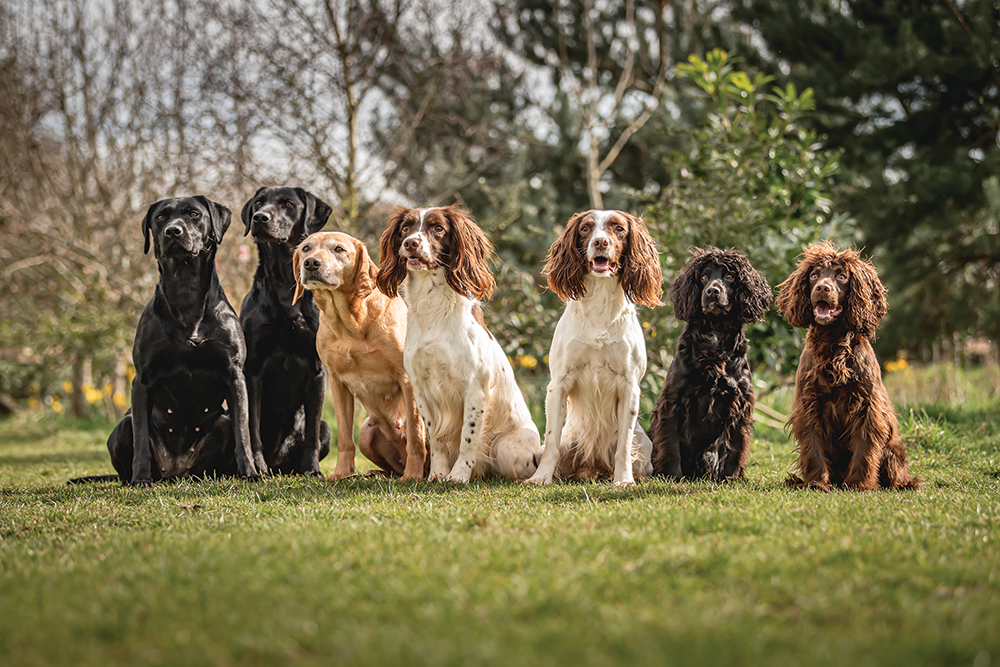
But it is cockers that Ben is most associated with, a breed that he admits he has a particularly soft spot for. “It’s their heart. They are little dogs, but they don’t seem to know that. They have the heart of a lion, and I just love that.”
Having known Ben since 2010, I can see why he has such an affinity with the breed. He himself isn’t the biggest of human beings, but he played rugby to a high level, and so do his two sons, both of whom are showing great promise on the rugby field. And I have no doubt that some of that drive and “never-say-die” attitude that set cocker spaniels apart from other working breeds is in Ben and his sons, too. I dare you to tell Ben that he can’t do something, because I’m pretty sure he will prove you wrong just for the sake of it.
And when it comes to gun dogs, he has inevitably had his detractors and doubters over the years—those who have continually asserted that his soft, trust- and reward-based approach isn’t as effective as the traditional tried-and-tested coercion or intimidation methods—but he has consistently proven them wrong. And after 35 years in the game, he is more certain than ever before that his approach is the best way to get the most out of a gun dog.
“Ah, but that approach won’t work with really headstrong dogs. Some dogs just need firm handling,” is an assertion that Ben has heard a thousand times over the years, and he has the most perfect case study to prove that it is wrong. And she’s called Field Trial Champion Heolybwlch Fatty.
“When I bought Fatty 14 years ago, I was actually a little bit frightened of her before she even arrived,” admitted Ben. “I had her half-sister, Cheweky Houston of Beggarbush, and she was a real handful. But in hindsight, despite winning a number of trials with her and making her a field-trial champion, I didn’t get the best out of her because I tried to contain her drive and strong will, rather than channelling it into doing what millions of years of evolution had equipped her to do perfectly.”
So by the time Fatty arrived, Ben knew that he had to do things differently and adapt his reward-based training even further to harness all this natural instinct in an even more positive way. “I remember playing with her on a grass bank,” he recalled. “She was so happy. And I remember thinking then that I needed to maintain that positive energy. My approach with Cheweky Houston had worked. She’d been good enough to win the Cocker Championship, but I didn’t ever have the control over her. So, I made a decision right there and then to find another way.”
And, before long Ben started to see that his more nuanced approach was working, and as they say, the rest is history. He and Fatty went on to win the ultimate prize in the spaniel field-trialing world, twice in consecutive years, the first time such a feat had been achieved in 48 years. And if it wasn’t for a mistake that Ben admits he made at her third championships at Sandringham, he believes she may well have gone on to win the title for a third time.
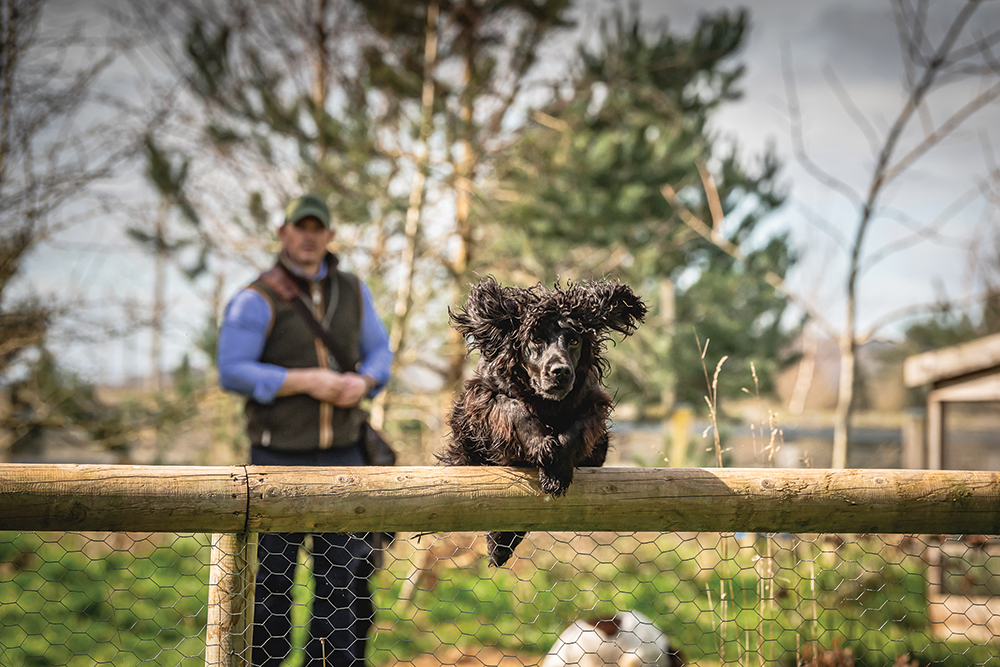
So, what is the secret to Ben’s success, not just in the field-trialing world, but in the gun-dog training world in which he is now undeniably a major player? At the heart of everything Ben does is his foundational training program that is based on trust and reward, what he refers to as BG Foundations.
“I do not believe in physical punishment or bullying a dog,” said Ben, unequivocally. “Everything is about helping the dog achieve and showing it how to achieve.”
For example, if Ben asks a dog to make a retrieve, and it fails, he will not reprimand the dog or send it again, but instead he will walk with the dog to the dummy and pick it himself and show the dog how to do it before repeating the exercise. This mantra is based on the principle that watching and observing others is how all intelligent animals—Homo sapiens included—learn new skills. This has been proven to be the case with chimpanzees and dolphins, where particular skills unique to certain family groups—like the use of tools—are passed on to their offspring by example. Conversely, Ben also asserts that reprimanding a dog for making a mistake can actually exacerbate things by making the dog afraid to fail and therefore afraid to try.
“If I threw a ball at my son and he dropped it and I responded by reprimanding him, he would be under a lot of pressure to catch it next time,” Ben said. “As a result, he would probably fail again. Removing that negative pressure gives the dog the confidence to keep trying, and as a result, you will bond and build trust and confidence in one another. The dog will have greater confidence in what you are asking it to do, and confidence in itself that it will be able to achieve what is being asked of it. You are effectively removing any shackles that may hold the dog back from progressing.”
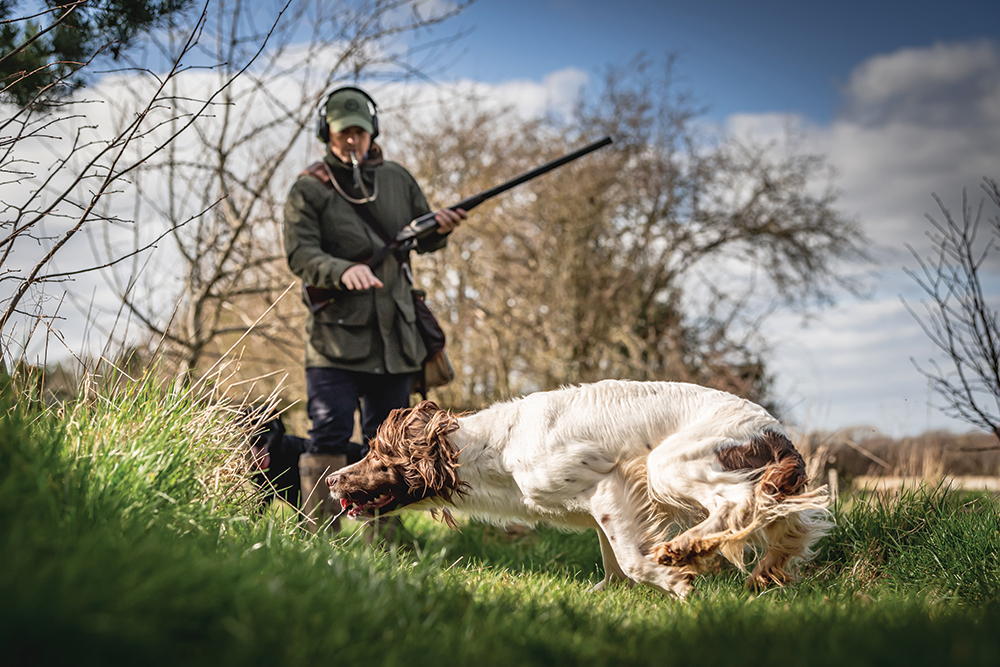
It is Ben’s belief that there is a trend towards this more passive way of training, as is the case with parenting and teaching children. “We shouldn’t bully people, so why should it be okay to bully dogs? And I have shown that it works, even at the very top level. I have proven that the old ways are outdated, and we know that bribery does not work or at least will not last over the course of the dog’s training.”
When I asked Ben what the difference between treat-based training and reward-based training is, he provides a perfect analogy. “If I ask my son to lay the table in return for payment,” he is motivated entirely by the treat or payment, so will only focus on that single task. So, when I ask him to clear the table, he won’t do it because he isn’t being paid. But if my other son sets the table, clears the table, and does the washing up, and I thank him, he will associate those tasks with something positive and be more inclined to do it again. My dogs work hard, do well, and then I reward them. They don’t get a treat for everything they do; it isn’t the treat they are working for, they are working for the enjoyment, because I make it fun and rewarding.”
And believe me, it works. It really works.
Originally published in Volume 9, Number 6 (October/November 2021)

















